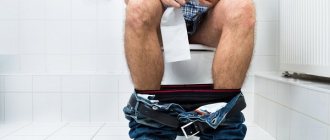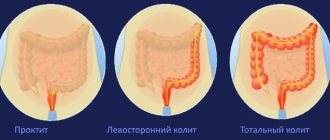What is considered chronic constipation?
Experts consider constipation (constipation) to be a delay in bowel movements for at least two days.
Other signs of this disease are difficulty in defecation and slight passage of feces, after which the patient retains a feeling of fullness in the intestines. This disease also includes a condition in which bowel movements occur every day, but the volume of feces released is small. Chronic constipation in adults is a pathology that occurs quite often. If stool retention does not cause discomfort, and there are no impurities in the stool (blood, mucus, pus, poorly digested food), this condition is considered normal.
Normally, bowel movements should occur 1-3 times a day, and up to once every 2 days. If the indicators exceed these figures, clinicians conduct a comprehensive examination and, on its basis, establish a diagnosis of “chronic constipation.”
How does a week or more of constipation affect the body?
The first signs of poisoning of the body with waste from their own vital activity appear faster in children than in adults, usually within a week. If defecation is delayed for more than 3 days, the baby’s appetite begins to deteriorate, sleep is disturbed, tearfulness and irritability appear. Of the external signs of weekly constipation, the most common are dry skin and rash. The accumulation of feces in the intestines will cause the formation of a large lump, which can damage the sphincter, causing pain and bleeding in the rectum.
If we talk about what severe constipation leads to in women, then irregular bowel movements are reflected in the appearance: a tired appearance appears, the complexion becomes gray, the skin dries out, fine wrinkles and inflammation appear on it. Bloating and increased gas production do not add to a woman’s self-confidence and attractiveness. The body and scalp suffer: dandruff and itching appear.
In men, the absence of stool for several days is fraught with inflammatory processes in the prostate gland. In adults and children, prolonged constipation leads to stagnation of bile, liver and pancreas diseases.
Causes of chronic constipation
The causes of the disease are not always due to a pathological nature; they can often be a manifestation of the following factors:
- insufficient fluid intake;
- sedentary lifestyle;
- frequent stressful situations;
- improper diet and regimen;
- strict work schedule;
- regular travel, etc.
In some cases, constipation indicates the occurrence of irritable bowel syndrome, characterized by impaired peristalsis with a change in stool frequency. Diarrhea occurs periodically, which is replaced by chronic constipation.
There are also pathological causes of the disease. In most cases, they require urgent surgical intervention. This pathology is intestinal obstruction, which occurs in the process of narrowing of the intestinal lumen due to helminthic infestations, adhesions, tumors, scar formation and other factors.
Constipation is often caused by fear of bowel movements. This condition is typical for some ailments that manifest as pain during bowel movements. These pathologies include anal fissures, hemorrhoids, paraproctitis, etc.
Causes
Constipation can occur for the following reasons:
- Poor nutrition . Most people suffer from this because their diet is low in fiber, which stimulates bowel function. Constipation occurs if a person gives preference to high-calorie protein foods, as well as various sweets and baked goods.
- Lack of fluid . Very often a person drinks less water than needed or replaces it with other drinks, such as coffee, tea, and sweet juices.
- Physical inactivity . This reason is common among those people who lead a sedentary lifestyle and do not engage in physical activity.
- Postponement of bowel movements . A person may not respond to the urge for various reasons, but if such behavior becomes frequent and constant, this will lead to a decrease in the urge and, as a result, constipation.
- Taking medications . Some medications negatively affect intestinal motility and can disrupt its functioning. This side effect is usually indicated in the instructions for use of the drug.
- Pregnancy . At this time, constipation can be caused by hormonal changes in the body, and is also associated with pressure from the uterus on the intestinal area.
- Psycho-emotional disorder caused by prolonged stress, life changes, and depression.
These reasons can cause constipation in apparently healthy people. Constipation can also occur due to surgery, abnormal development of internal organs, or various diseases.
Types of chronic constipation
In medicine, chronic constipation is divided into several types:
- nutritional – caused by poor nutrition;
- neurogenic – arise in the process of disruption of neuro-reflex function;
- Iatrogenic – appear after taking medications;
- toxic – are a consequence of intoxication;
- proctogenic – arise due to disruption of the pelvic muscles;
- mechanical – caused by the formation of obstacles in the intestines (scars, polyps, tumors, various developmental anomalies, etc.);
- anorectal diseases - these include fissures, hemorrhoids, etc.;
- psychogenic – caused by a change in emotional state.
Complications and consequences
In the absence of timely and adequate treatment, the consequences of chronic constipation are quite serious. As a rule, due to hard stool, the patient develops cracks in the anus, which causes the development of hemorrhoids. Constipation is often a catalyst for diseases such as colitis, enteritis and inflammation of the appendix. There are frequent cases of hepatitis, as well as complications of the functioning of the biliary tract.
However, the most serious complication of chronic constipation is cancer. The development of tumors of the colon or rectum is explained by the prolonged presence of carcinogens inside the intestine. Constipation, as a disease, occurs gradually, but often becomes chronic. If the first symptoms appear, you need to contact a specialist and start treatment in a timely manner.
Diagnostics
In the process of diagnosing this condition, the specialist takes into account that this ailment is not an independent disease; most often its manifestation is a consequence of the manifestation of another pathology or is caused by a particular diet and lifestyle. During a comprehensive examination, the doctor excludes drug constipation due to intestinal pathology (diverticulosis, Crohn's disease, colorectal cancer, as well as acquired anomalies of the colon).
The examination of the patient includes a patient interview, general examination, palpation, rectal examination, radiological studies (irrigoscopy, abdominal radiography), colonoscopy. Depending on the expected diagnosis, a specialist may prescribe for a patient with this pathology a stool test for the presence of blood, a coprogram, an intestinal biopsy, a bacteriological examination of stool, various manometric techniques (sphincterometry, anorectometry), as well as consultations with a therapist, cardiologist, pulmonologist, endocrinologist and other specialists.
Main risk group
The following categories of people are at risk:
- Babies. In children of the first year of life, the digestive system is not fully formed, which leads to various problems, including constipation. The introduction of a new product and non-compliance with the diet by a nursing mother lead to stool disturbances.
- Office workers leading a sedentary, sedentary lifestyle. You should definitely exercise to avoid digestive problems.
- Aged people. In older age, there is a weakening of the intestinal muscles, which cannot cope with the timely removal of waste products from the body.
- Patients on long-term drug treatment. Serious antibacterial drugs destroy beneficial bacteria in the stomach, which are responsible for digestion processes. This is why stool stagnates in the colon. Restoring normal intestinal microflora can solve this problem.
Treatment methods
There are several methods for treating chronic constipation, these include:
- drug treatment;
- acupuncture;
- physiotherapy and reflexology;
- phytotherapy;
- prescribing a special diet.
Traditional medicine focuses on the use of drugs for chronic constipation. In many cases, they have an immediate or one-time effect, so in addition to taking medications, lifestyle changes are recommended.
Drug treatment
Laxatives for constipation often cause problems due to addiction to drugs in this group. When choosing this method, you must follow the recommendations of a specialist:
- take one type of drug;
- follow a strictly prescribed course;
- If the effect decreases, consult a doctor immediately.
There are two types of drugs that facilitate and speed up bowel movements. The former actively promote contents in the intestines; their composition is based on bisacodyl, anthraquinones, picosulfate, and also includes buckthorn and rhubarb.
The second group of drugs performs a different function - it enriches the intestines with water, which has a beneficial effect on the consistency of the stool (it becomes less dense). Their composition includes various salts, and lactulose or macrogol is used as the active substance.
How to treat chronic constipation at home
Drug treatment is often supplemented with proven traditional methods, these include:
Senna
One of the most effective laxatives, a composition from senna. For this you need 2 tsp. Mix senna with 100 g prunes. Brew the mixture with 0.5 liters of boiling water and leave for 3 hours and strain. Take 3-5 tbsp. l. every hour until constipation disappears completely.
The use of this remedy has few contraindications. In rare cases: abdominal pain, loss of appetite. Its effect occurs 5-8 hours after administration.
Prunes
0.5 kg of prunes should be poured into 3.5 liters of water, boiled for 20 minutes, added 50 g of buckthorn bark and boiled again for 20-30 minutes. Cool, strain, pour 200 g of “Holosas” (rosehip extract) into the resulting mixture. Take 100 g of healing decoction at night.
Bran
Bran is a fairly effective remedy for constipation. In the first 10 days, it is recommended to take 1 tsp of bran, brewing with boiling water, and the settled crumb should be consumed 3 times a day. The next cycle lasts 2 weeks, but the dose of bran is increased and is 2 tbsp. spoons at a time - also 3 times a day. Afterwards, dry bran is taken 2 tsp. while eating. This course of treatment lasts 2 months.
Eating bran improves intestinal motility and makes it easy to get rid of waste products.
Diet
Proper nutrition is a great way to get rid of chronic constipation. The diet is based on a diet enriched with natural products and dietary fiber. Natural products are rich in fluid, phytonutrients and vitamins that speed up bowel function. People suffering from this pathology or susceptible to it should consume 0.5 kg of vegetables and fruits daily.
You should also focus on fermented milk products, baked goods made only from wholemeal flour and cereals: buckwheat, barley and oatmeal. These products have a beneficial effect on the bowel movement process. Patients with this disease are recommended to eat pumpkin, spinach and bee products.
If chronic constipation is diagnosed, special attention should be paid to fluid intake. Drinking should be frequent and plentiful. It is recommended to drink more mineral water and juices. Lemon juice is a natural laxative and is recommended to be added to drinking water and other drinks. Drinks made from nettle, carrot, dandelion and flax seed are also effective in treating constipation. Kvass and beer also help relieve constipation, but they contain alcohol, which is a contraindication in the treatment of any disease.
Drinking should be included in the diet before meals, before bedtime and immediately after it. During the treatment of chronic constipation, it is better to avoid coffee, black and green tea.
Prevention
Due to such severe consequences of the disease as intoxication and the development of pathologies, this condition requires the supervision of specialists. At the same time, preventive measures are no less important than timely assistance. The following measures can significantly reduce the risk of developing this condition:
- Compliance with diet. You need to eat 3-4 times a day, keeping a break between meals of no more than 3-5 hours. It is recommended to stop eating 2 hours before bedtime.
- Diet correction. For preventive purposes, it is important to consume foods that contain dietary fiber: bran, nuts, fresh vegetables, fruits and fermented milk products. It is worth limiting meat, viscous cereals, fat, alcohol - they contribute to the opposite (strengthening) effect. It is necessary to drink 1.5-2 liters of liquid (if there are no contraindications), giving preference to drinking water and sugar-free compotes.
- Control of stressful situations. One of the measures to prevent constipation is the ability to avoid nervous tension. You need to try to control your state of mind during times of stress.
- Compliance with bowel movements. This is as important as following a diet. During normal functioning of the gastrointestinal tract, the first bowel movement should occur in approximately 15–30 minutes. after breakfast. A glass of any juice drunk on an empty stomach contributes to the rapid activation of the gastrointestinal reflex. To avoid causing intestinal upset, it is not recommended to suppress the urge to defecate. You should also avoid uncontrolled use of tablets and teas for constipation, since their prolonged use can cause “lazy bowel syndrome.”
- Physical activity. An active lifestyle has a beneficial effect on the movement of feces in the intestines, improves its peristalsis and blood supply. There are also special exercises that can be performed to prevent constipation and improve the functioning of the entire digestive system as a whole.
Chronic constipation is a pathology that can be cured. If you follow all of the above preventive measures, you can get rid of chronic constipation forever and prevent further development of the disease.
Diagnosis of frequent constipation in adults
If constipation is a new symptom, then a particularly careful diagnosis of the patient is necessary.
It is necessary to establish the frequency and type of stool, problems associated with fecal excretion, and the duration of constipation. Absence of the urge to have a bowel movement or a sudden need to have a bowel movement is usually observed in idiopathic constipation. Fecal masses in the form of individual hard lumps that resemble nuts, or dense oblong lumpy fragments occur with functional disorders of the act of defecation. Complaints about forced effort to empty the bowels, the need for assistance during bowel movements, a feeling of incomplete emptying and other symptoms also refer to functional frequent constipation. If the patient has associated symptoms such as fever, abdominal pain, blood in the stool, vomiting, or has a history of illness, it is important to conduct an extensive diagnosis.
It is also important to assess the patient’s mental health, check for symptoms of endocrine diseases or diseases of the nervous system that occur with constipation. Proctologists at the Yusupov Hospital conduct a digital examination and evaluate the tension of the anal sphincter, the presence of ulcers and fissures, rectal prolapse and hemorrhoids. Check for warning signs that may indicate the possibility of an organic cause. These symptoms include:
- Loss of body weight;
- Fever;
- Blood in the stool (visually detected or hidden);
- Anemia;
- Assess whether changes occur during objective examination;
- Stomach ache;
- family history that may indicate colon cancer;
- Nonspecific colitis.
Also, proctologists at the Yusupov Hospital, if necessary, resort to the following additional research methods:
- Hidden blood in stool;
- Laboratory blood tests such as complete blood count, serum glucose and calcium levels;
- Rectal biopsy if Hirschsprung's disease is suspected;
- X-ray and endoscopic examination of the large intestine. Colonoscopy is a mandatory type of examination in people over 50 years of age, or in patients with accompanying symptoms, in order to detect colon cancer.











